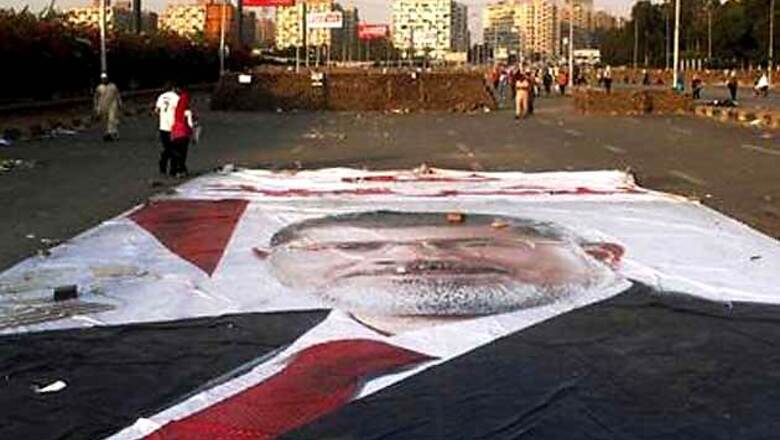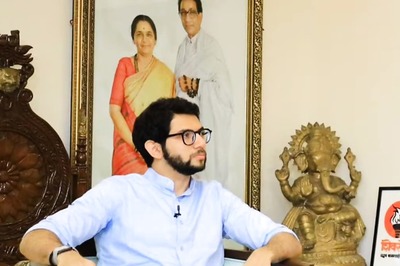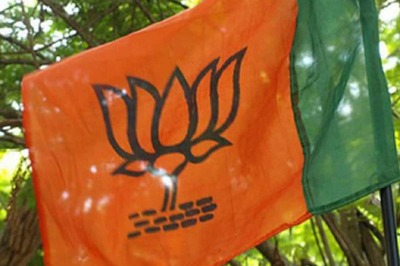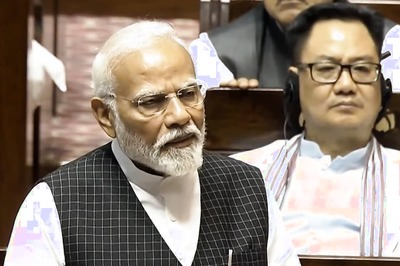
views
The Muslim Brotherhood on Monday rejected pleas from international envoys to "swallow the reality" that Mohamed Morsi will not return as Egypt's president.
The envoys from the United States and the European Union, trying to resolve a political crisis brought on by the army's overthrow of the Islamist Morsi a month ago, visited jailed Brotherhood deputy leader Khairat El-Shater in the early hours of Monday.
But he cut the meeting short, saying they should be talking to Morsi, Brotherhood spokesman Gehad El-Haddad said. People briefed on the meeting described it as long, in some moments intense, but constructive and useful.
From the other side, a senior military source said the army and interim government would offer to free some jailed Muslim Brotherhood members, unfreeze its assets and give it three ministerial posts, in a move to end the crisis.
A source involved in the diplomatic initiative said the releases from prison were expected within hours.
The releases would be a confidence building measure, and the Brotherhood would be expected to make goodwill gestures to show they have good intentions.
The army spokesman, Ahmed Ali, said no deal had been reached between the Brotherhood, the military and the government to end Egypt's political crisis.
Several thousand Islamist supporters marched through downtown Cairo calling for Morsi's reinstatement and denouncing the army general who led his overthrow.
Marchers chanted: "Morsi, Morsi" and "We are not terrorists", and waved pictures of the ousted leader.
The protest showed tensions still running dangerously high in Egypt despite the mediation effort by the United States, the European Union, Qatar and the United Arab Emirates.
"Things should move soon, otherwise we shall miss this opportunity. This is all still incredibly fragile." said a source involved in the diplomatic initiative.
Morsi became Egypt's first freely-elected president in June 2012, 16 months after the overthrow of US-backed strongman Hosni Mubarak, who had ruled for nearly 30 years.
But fears that he was trying to establish an Islamist autocracy, coupled with a failure to ease economic hardships afflicting most of Egypt's 84 million people, led to huge street demonstrations, triggering the army move.
Speaking about the talks in recent days, Brotherhood spokesman Haddad said the envoys "still carry the position that we should swallow the reality and accept that the military coup has happened and try to recover with minimum damage".
"We refuse to do so," Haddad told Reuters.
There was no agreement on how to start talks, he added.
The state news agency said earlier that diplomats, including US Deputy Secretary of State William Burns and European Union envoy Bernardino Leon, had met Shater after midnight at the Tora Prison where he is being held south of Cairo.
Shater is seen as the political strategist of the group that propelled Morsi to office in 2012, and was arrested on charges of inciting violence after Morsi's downfall.
He told the envoys that only Morsi could "solve the mess" and the only solution was "full restoration of constitutional legitimacy and reversal of the coup", Haddad said.
"They invited him for discussions but he ended it abruptly ... then he walked out of the room," Haddad said.
Morsi is being held at an undisclosed location, facing an investigation into accusations including murder. Most of the rest of the Brotherhood's leadership is also in custody.
In Washington, State Department spokeswoman Marie Harf said Burns had no plans to meet Morsi. She suggested no breakthroughs were imminent.
"There is clearly much more work to do. We have the goal of helping the Egyptians get back to a democratically elected, inclusive government," Harf told reporters.
The diplomatic push has so far helped to hold off further bloodshed between Morsi's backers and the security forces.
An EU source in Brussels said the mediators were still trying to build confidence between the various sides and did not want to raise expectations.
"The real thing at this stage is to bring people together so they can actually meet and discuss these issues and for that you have to build up some trust and that can be done by very concrete measures, releasing people, dropping charges, not pressing charges, not moving into the squares, lowering the tension," the source said.
Thousands of Morsi supporters remain camped out in two Cairo sit-ins, which the government has pledged to disperse. The government said on Sunday it would give mediation a chance but warned that time was limited.
Almost 300 people have been killed in political violence since Morsi's overthrow, including 80 shot dead by security forces in a single incident on July 27.
During Monday's march, protesters sprayed graffiti on walls and statues calling army chief General Abdel Fattah al-Sisi, who led Morsi's overthrow, a murderer and a traitor.
Security forces made no attempt to disperse a crowd estimated by reporters at several thousand strong.
"The military came and stole our country, they stole everything," said Mahmoud Isuafi, a businessman from the Nile Delta city of Mansoura. "I want democracy. Where is my vote? I can no longer elect my leader so I protest instead."
The military has laid out a plan that could see a new head of state elected in roughly nine months. The Brotherhood, which spent decades in the shadows before Mubarak's downfall, says it wants nothing to do with it.
However, diplomats say the Brotherhood knows Morsi will not return as president and wants a face-saving formula for him to step down that guarantees it a stake in the political future.
Two US senators, Republicans Lindsey Graham and John McCain, arrived in Cairo at President Barack Obama's request to meet members of the new government and the opposition.
Before leaving on the mission, Graham said the Egyptian military must back out of politics quickly or risk a cut of the $1.5 billion in aid it receives from Washington each year.


















Comments
0 comment